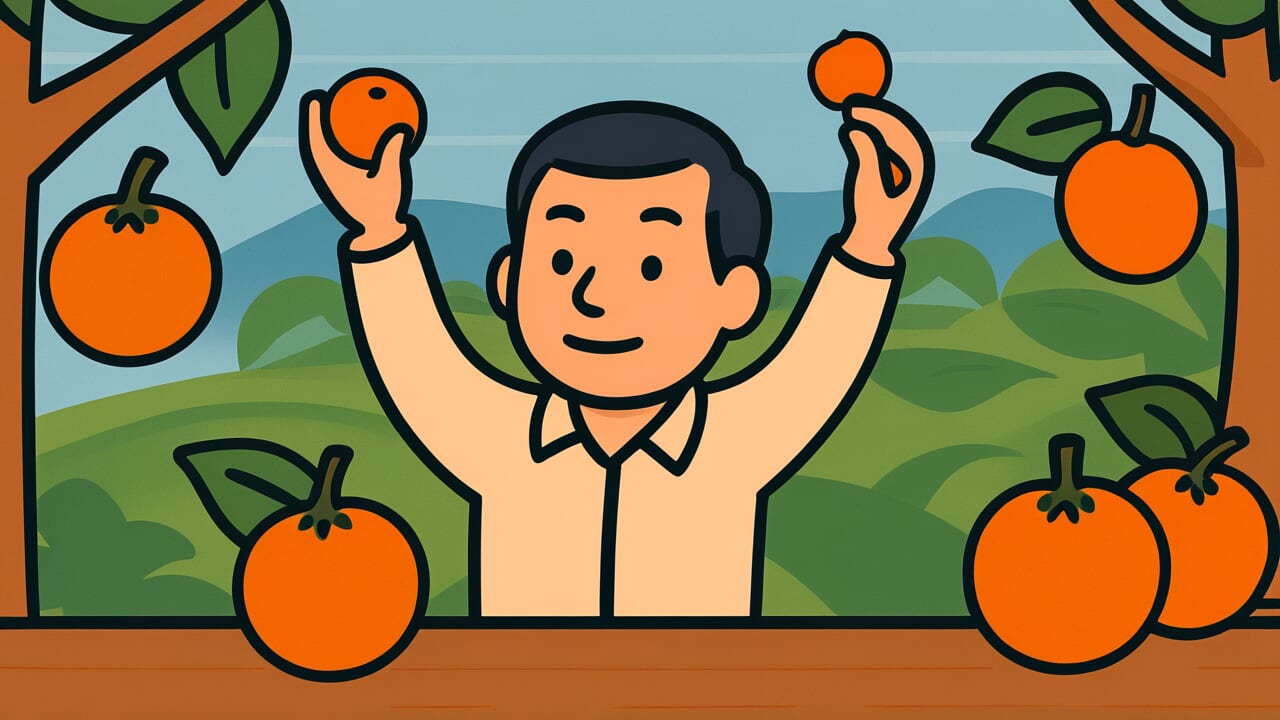How to Read “Stealing persimmons without hiding the pits”
Kaki wo nusunde sane wo kakusazu
Meaning of “Stealing persimmons without hiding the pits”
This proverb shows a truth about human behavior. When people do something wrong, they often fail to hide the evidence completely.
The saying comes from a simple image. If you steal persimmons and eat them, you’ll have pits left over. If you don’t hide those pits, everyone will know who stole the fruit.
The same thing happens with wrongdoing. No matter how carefully someone plans something bad, they always leave some clue behind.
People use this saying when someone gets caught because they left obvious evidence. You might say “That person is like stealing persimmons without hiding the pits” about someone who commits a crime but makes careless mistakes.
This happens all the time in modern life. People post inappropriate things on social media and get exposed. Others commit fraud but leave a clear paper trail.
The proverb captures a universal truth. It’s nearly impossible to hide wrongdoing perfectly. Somewhere, somehow, the truth will come out.
Origin and Etymology
We don’t know exactly when this proverb first appeared in writing. But we can learn a lot from looking at the words themselves.
The choice of persimmons tells us about Japanese life and culture. Persimmons have grown in Japanese gardens and fields since ancient times.
In autumn, these trees produce bright orange fruit. The sweet, delicious persimmons were a perfect snack for children. Sometimes kids couldn’t resist taking fruit from someone else’s tree.
The key part of the proverb is “without hiding the pits.” When you eat a persimmon, you always have pits left over. If you don’t hide those pits, everyone knows who ate the fruit.
This everyday situation perfectly captures human behavior. People who do wrong things often fail to cover their tracks completely.
The word “kaku” (核) for pit is interesting. Today we often write “seed” differently, but this character means “core” or “nucleus.” It suggests something central that cannot be hidden.
Perhaps the proverb has a deeper meaning. The core truth of wrongdoing can never be completely concealed.
Interesting Facts
Persimmon pits are surprisingly large. Each fruit contains about four to eight pits. After eating the flesh, these pits are quite noticeable wherever you leave them.
In old Japanese houses, people often ate persimmons on the veranda or in the garden. If you spit out the pits there, everyone could see who had been eating.
Japanese culture has a tradition called “kimorigaki” (tree-keeper persimmons). When harvesting, people leave a few fruits on the tree. This shows gratitude to birds and hopes for next year’s harvest.
It also shows restraint – not taking everything. This cultural background may have helped create proverbs about persimmons.
Usage Examples
- He falsified his expenses but kept all the receipts – truly stealing persimmons without hiding the pits
- Hacking into the system without deleting the logs is exactly like stealing persimmons without hiding the pits
Universal Wisdom
This proverb has survived because it reveals a fundamental human contradiction. People plan wrongdoing carefully, but during execution they always make mistakes.
They get careless, panic, or leave unexpected evidence behind.
Why can’t people hide wrongdoing completely? Because humans aren’t perfect. No matter how careful the plan, emotions interfere with judgment.
Panic, overconfidence, and guilt all cloud thinking. The person who steals persimmons but doesn’t hide the pits is feeling “I’m probably safe now” or “I need to get away quickly.”
The proverb also carries a moral warning. Perfect crimes don’t exist. Our ancestors learned this truth through experience.
Even the smallest piece of evidence can reveal the truth.
There’s another layer to this teaching. If you can’t hide it completely, don’t do it in the first place. This is preventive wisdom.
When tempted to do wrong, remember this proverb. Imagine the exposure and shame that will follow. That might help you resist.
The saying acknowledges human weakness while encouraging us to live righteously. It’s both warm and strict in its guidance.
When AI Hears This
From an information theory perspective, not hiding the pits is actually rational behavior. Pits are “incompressible information.”
Shannon, who founded information theory, proved that all information has compression limits. You can compress “AAAA” to “A times 4,” but random strings can’t be compressed further.
Pits work the same way. Traces of eating, juice on hands, fibers on clothes, soil particles – these all follow physical laws. They inevitably appear.
The more you try to erase them, the more new traces you create. The act of concealment itself generates information.
This connects to the second law of thermodynamics. Entropy in any system always increases. Stealing persimmons causes countless tiny environmental changes.
Footprints, broken branches, disturbed arrangements – this “disorder” cannot be physically reversed. Crime investigators say “perfect crimes are impossible” precisely because of this principle.
People who don’t hide the pits may unconsciously understand this truth. The cost of concealment is too high. It only creates more traces.
Information never disappears. It just changes form and remains somewhere forever.
Lessons for Today
This proverb teaches that honesty is the smartest way to live. Dishonesty and lies may seem profitable at first, but they always unravel eventually.
In the social media age, small contradictions and evidence spread instantly. The consequences can be devastating and permanent.
The key is moving beyond “it’s okay if I don’t get caught” thinking. Don’t focus on whether you can hide something. Instead, choose actions that don’t need hiding.
This isn’t just moral philosophy. It’s the lowest-risk approach that preserves your peace of mind long-term.
If you make a mistake, have the courage to admit it early rather than hide evidence. Honest apology causes far less damage than desperately trying to hide the pits.
Honesty sometimes requires courage. But it becomes your strongest shield of protection.



Comments